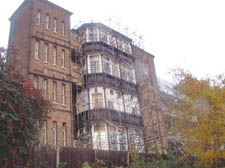|
|
 |
| |

Whittington Hospital |
Whittington boss dismisses talk of threat to casualty unit‘
A and E is safe. It will open 24 hours a day, seven days a week… all year’
A REVIEW of the NHS in London has sparked a row between the chief executives of Whittington and University College London hospitals over the future of accident and emergency services in the borough.
The report, published by junior health minister Professor Ara Darzi last week, recommends a massive reorganisation of GP surgeries and hospitals, which could see the creation of hundreds of “polyclinics” – super-GP surgeries – and the closure of some A and E departments.
University College London Hospital (UCLH) chief executive Robert Naylor pointed out last week that the Whittington could be under threat.
Mr Naylor said his own A and E department in Euston would be safe, but added: “We’ve just spent £400 million on a 40-year contract. Of course, it’s not going to be under threat. It’s going to be very positive for UCLH.
“Hospitals that may be most challenged are those providing mainly local acute services, like the Whittington. Some of their less complex services could be reprovided in the new polyclinics, while more of the complex cases will be centralised in specialist centres like the new UCLH.”
But Whittington chief executive David Sloman disputed this, saying: “Mr Naylor is totally missing the point. The Darzi report is not about complex surgery, polyclinics or institutions, it’s about people and patients.
“The other important principle is that most care will be closer to home although some of the complex care will be in specialist hospitals – it’s to localise where possible and centralise where necessary. The Whittington is extremely well placed to contribute to that and flourish under the Darzi vision.”
He added: “A and E is safe. The hospital will have an A and E department open 24 hours a day, seven days a week, throughout the year, and it is really important it is clear that there is no threat to this service.”
Mr Sloman, Mr Naylor and Andrew Way, chief executive at the Royal Free Hospital in Hampstead, all welcomed the report, which they say will give hospitals a chance to develop specialist areas.
Both Mr Naylor and Mr Way have pinned their hopes on linking their hospitals with polyclinics on-site, while Mr Sloman says he is considering the concept.
Mr Way, who wants to develop the Royal Free’s expertise in stroke and cardiac services, said: “We want to talk to PCTs (Primary Care Trusts) about how to develop a polyclinic that has GPs sitting alongside hospital consultants, dentists, optometrists and pharmacists. We’ve got a lot of space.
“Although it might be in this building, it becomes something GPs take a lead influence in co-ordinating care around patients rather than coming backwards and forwards from GPs to hospitals.”
The reforms will also look at making individual hospitals into specialist centres. Mr Sloman wants the Whittington to develop its expertise in the care of women and children.
He said: “We have found that women are choosing to come here. Our births have gone up by 16 per cent this year and continue to rise.”
Whttington plans to rebuild its maternity wing under a £50 million project.
At UCLH, Mr Naylor said: “We aim to become world class in neuroscience, women’s health, cardiac and cancer – these are the things we’re so strong at.”
When asked if the hospital will suffer by the loss of A and E patients to polyclinics, he said: “A small number of those will go but they will be dwarfed by the large number of complex patients that will come to us.
“The evidence is that patients survive and live longer if they go to specialist hospitals. Since this report has been in gestation, we’re planning to have a polyclinic at UCLH.” |
 |
|
| |
| Your Comments: |
| |
| |
| |
|
 |
|